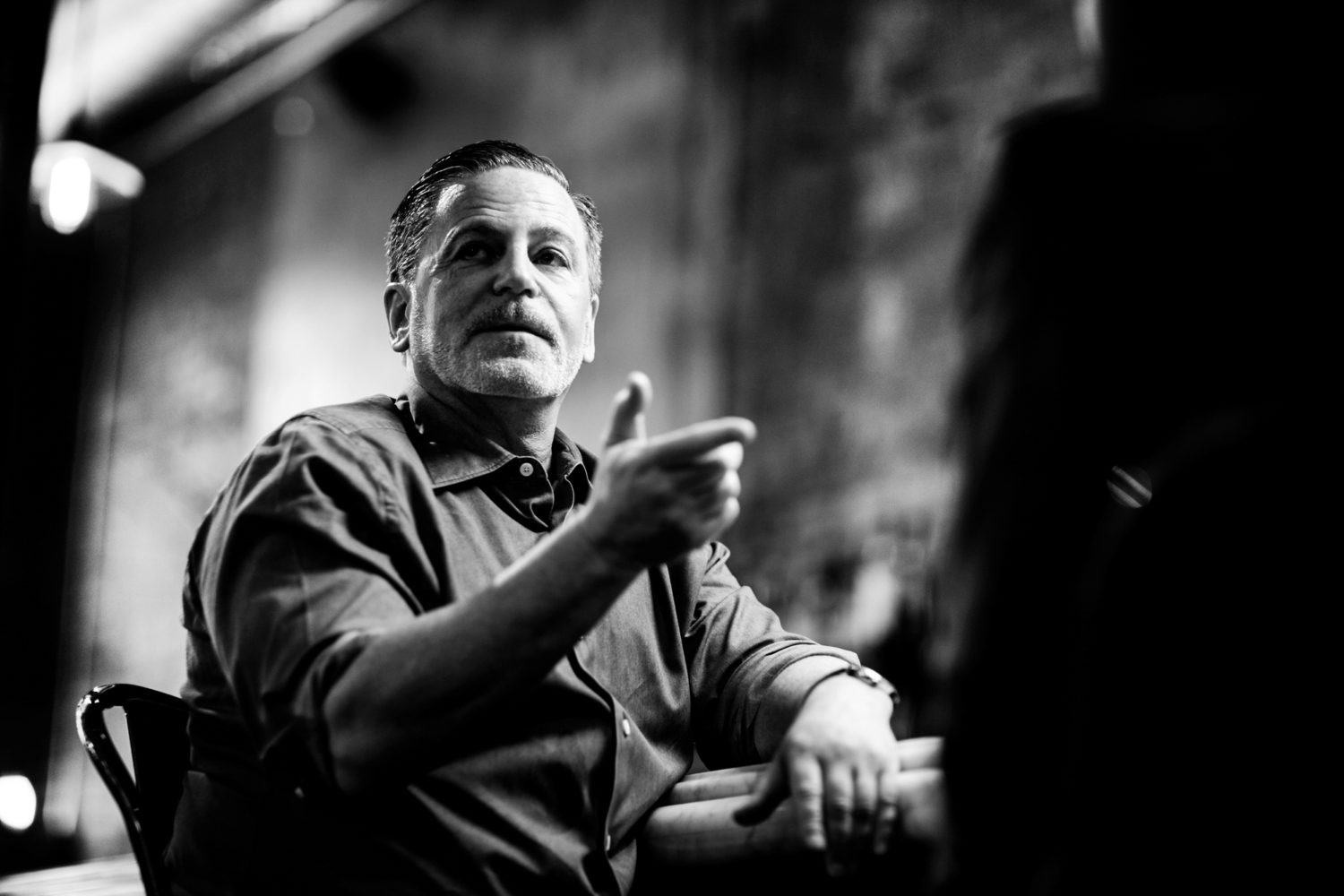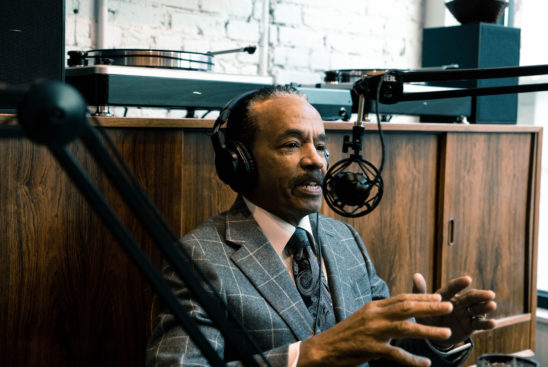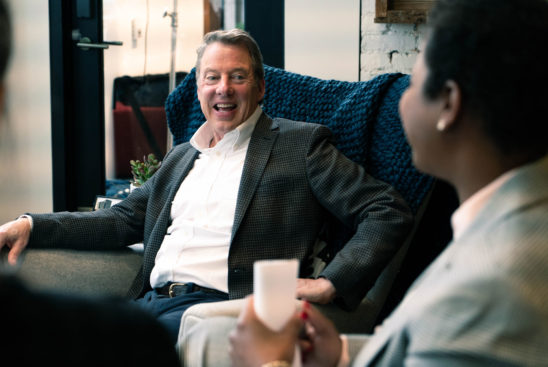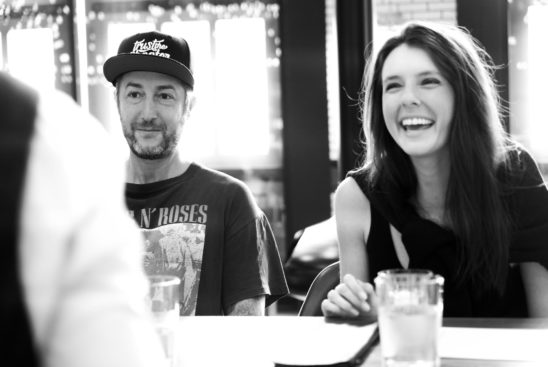Cheers! Thank you for coming and having a drink.
Usually I have two to three Scotches on a Monday mid-day, but I hadn’t had any today so…
So this is the first drink?
This is perfect. Yes, exactly [laughs].
I don’t know where to start. Thank you for everything you’re doing in my hometown. Before we get into Detroit and business advice, what were you like as a kid?
I always thought that is the only question someone shouldn’t answer about themselves. I guess just in broad strokes I was always entrepreneurial. I had candy sales. I once opened up a pizzeria in my mother’s kitchen. I put my younger brother and his friends on bikes for deliveries. We used to make those Chef Boyardee pizzas and we actually put flyers in a bunch of the neighbors’ mailboxes. Later that week, we got calls from the health department and they closed us down. We didn’t have licenses and we were violating all kinds of health codes, so it was actually my first exposure to regulation and government.
And both your father and grandfather had businesses in Detroit?
Yeah, my dad was in the U.S. military for many years and then he went and opened a bar in Detroit. Actually, he was out at Seven Mile and Woodward in a bar. I used to go with him sometimes. It was a bar like this sort of. It was about this size actually. There was an adding machine I used to play with. My grandfather had a couple of car washes.
What do you think your father and grandfather’s reaction would be to what you’re doing in Detroit now?
My dad had me later in life. He would have been 100 this year, believe it or not. When he died we weren’t in Detroit yet, but he used to follow around and go to different construction sites and things. Those generations would talk about Detroit… you have to be older than me — 10 years older than me — to remember what people characterized as the unbelievable downtown Detroit. So you’d hear that over the years from them, so yeah they would be excited to see this. Maybe they are, who knows!


You went to MSU. How old were you when you started your first business, Rock Financial?
I was 22. What happened was I went into one of those shared workspaces in the summer — well now it’s called WeWork, who we just put in Detroit — but back then it was called shared office space. You didn’t need a license for mortgages or anything at that point. I took a 12×12 office and you’d put loans in your car and broker them, get on the floor and beg and plead underwriters to approve our loans at the banks. I thought it was going to be a summer thing, now it’s 32 years later.
How much did you have in your bank account then?
I know exactly. I had delivered pizzas, a lot of pizzas to that point and I did have about $5,000 in the bank and that’s what I started the business with. Back then I had a RadioShack computer if you can imagine that. We hustled. We hired kids out of college. Back then, advertising mortgages was sort of looked upon as cheesy. Remember those Homes magazines? We used to have Homes before the Internet. They were free and you could pick them up at any store. We used to [advertise mortgage rates] and take the back cover out. People would say, “Why would you do that?” But the phones rang. We differentiated ourselves back then by trying to market differently and hustling.
Who along the way is someone you remember because they gave you a chance?
It’s kind of a weird thing, but I’m one of those people who never really had a mentor. It’s not because I wouldn’t want one or didn’t think it was valuable, but I never really had a mentor. I read two books in the ’80s by a guy named Tom Peters. He wrote “In Search of Excellence” and “A Passion for Excellence.” He was a McKinsey guy that spent 25-30 years going from company to company and he wrote about how messed up culture was in American companies, even back then. It really made a big impression on me. He made a comment I’ll never forget— and this was not a slight against the middle manager so hang on because it sounds crude. He said, “After 25 or 30 years of consulting big American companies, if 98 percent of the middle managers were not born, their companies would be further ahead.” And then he went on to explain he wasn’t criticizing the middle managers, he was criticizing the environment they put these otherwise good human beings into and turned them into worthless leaders and then he went in to all of the reasons why. That made a big impression.
Was this guy responsible for your ISMs — your unique philosophy and leading culture that drives success across your family of over 100 companies ?
I mean he was responsible for sure for pointing out what culture was. Before I read those books I remember older people asking me, “Hey kid, what’s your company culture like?” I would really look at people like, “What are you talking about?” I had no idea what they meant. I thought, “I have to get a loan to the closing, dude. I don’t know what you’re saying.” But you learn over time how big and important it is. It’s everything.


Why do you think it’s important for people — even people who don’t live here — to care about what’s happening in Detroit?
There are four big categories of issues. If you look at Detroit or any urban core that has had problems, there’s blight, lack of jobs, education issues and crime. Everything can go into those four categories. Blight to me was number one because if you don’t take care of the blight you’re not even going to get to the other three. We are making major progress on that. Crime is down everywhere in the neighborhoods and the city. A lot of people think more people, more crime. It’s actually the opposite because there are more eyeballs. You can’t do crime when a lot of people are looking at you. Unemployment was 24 or 25 percent in the city and it’s down to [around] 7 percent. We still have to address people who have taken themselves out of the work force and there are things going on [for that]. Education is still the one that needs the most attention. There is finally some progress being made, but it has a long way to go. So if you look at all of those, those are going in the right direction. Downtown is full right now, there is no office space left. There are no residential units left, so we are going to be building. But the big thing is car technology. I went to CES in Las Vegas, the Consumer Electronic Show, and all they want to talk about is car technology. In my meetings with the big three here and Waymo — which is google’s automated car technology — [we talk about how they] are coming to Detroit. They are opening offices in Detroit. It’s a sea change that is going to drive a lot of the economy over the next ten years and Detroit is ground zero of that. I’m very, very optimistic about Detroit.
Can you paint the picture of what it feels and looks like to live and work in Detroit in 10 years?
If someone would have said five years ago that we’re going to be out of office space and residential units, 100 percent occupancy downtown and Midtown it would be unfathomable and you would have said, “You’re crazy, that’s impossible.” But since that is the case here, the only way to grow is vertically. I think when you say five or 10 years from now you’re going to see big projects completely done, the whole skyline is going to be completely different. That will be the main thing people notice. I’m hoping that in 10 years Detroit is one of the handful of technology, entertainment and marketing centers of the United States or maybe the world. People like you for instance, who have their own business, 30 years old, they’re a creative class, this is the place to be. This is where the action is. What the manifestation of that will look like I don’t know exactly but those are the themes. And we are growing. That is the key thing. The population is growing, things are happening.

Was there ever a time you almost turned your back on the city like so many people did before you moved downtown?
I wouldn’t say turned my back on the city, but what I had done like a lot of entrepreneurs — it sounds like I’m a real old man but I did start young — for the first 20 years I had my head down and we were just grinding our one business and building, building, building. I never really looked up and paid much attention. I was just focused on our business. In a sense, it was turning your back because you weren’t paying attention. We had a name for folks in the suburbs and I may have been one of them for a long time. We called them “dozers.” We were just sleeping on it. I will tell you one thing though, when we moved, we only moved 1,500 people the very first day and I was one of them. From the day — not the second day — we got down here you just knew in your bones that it’s going to be so much better than being in a suburban office. Nothing against the suburbs, I’ve lived there my whole life. I grew up the first five years in the city. There is just an energy, collaboration, connectivity and a buzz you’re not going to get in Livonia or Troy, it’s not going to happen.
Is there anyone you want to see come back and reinvest in the city?
They are coming back! I took Madonna through the city a couple of years ago. Kid Rock is from here. There are other guys who aren’t as known but have a lot of wealth and connections in business. They are all investing. Steve Ballmer grew up here and went to Country Day. He retired from Microsoft. Now, he has a large foundation and he wants to do things. You can’t just say, “Hey, come on in and just do something.” We as a city have to say, “Here is what we think you should do.” A lot of them are already engaged.
Do you just pick up the phone and call anyone you want?
Detroit has this old negativity that people associate with it. It also has this cachet to it now, only the last year or two. Now the calls are starting to be inbound and it used to be us calling outbound. And that goes for people coming out of college. We just had an interesting thing in the middle of the winter called a “Winternship.” We had six kids from Brown and six from Harvard. They came here for two weeks and we put them on a project, but 150 kids applied from Harvard and Brown to come to Detroit in the middle of the winter. Who would have ever thought? That is craziness. It’s really starting to have that turn. When the smart people start realizing and they are realizing… they’re smart because the number one rule of economics and life is to buy low sell high. You want to get in before prices move up.


Right now you’re focused on building vertical in Detroit, when you first started buying buildings back in 2010 were you nervous at all?
Going up is a lot harder by the way. Just for the record. We have a little bit of an advantage in that we aren’t a real estate developer first, we are businesses first. So we had the employees, we had the people working. We moved in 1,500 people, our businesses were growing rapidly, we still had many people in the suburbs in leases that were expiring and at the same time beautiful architectural gems were available at low prices at bargain rates. We started picking them off. We didn’t have a plan we were going to buy 90 something buildings. We just said, “Okay, how can you not buy this beautiful building?”
How do you want to be supported, right now, today?
Well, it’s the first time anybody ever asked that. It’s all about young people, that’s our whole thing. Your generation, young people even down to 20 years old. We have this intern program, 1,400 interns came last summer representing 210 colleges and universities in the United States and the great news was 27,000 applications came in. And it’s not necessarily Quicken Loans, it’s just this Detroit thing. This generation wants to impact the community more than previous ones. I use it to sell against New York and Chicago. I say, “Look, you’re smart, you graduated from a great place, you have energy, you can go to New York, Chicago, Miami or whatever and you’ll do great.” I say, “But what you won’t do there is see the benefits of what you’ve done in the community immediately and you’ll impact the city.” You can do that here. Other cities are already evolved and you can’t do that there. That’s what I use to sell people now. Five or six years ago if you would have told me that, it’s just impossible to think that would happen. That’s the one thing I learned down here, momentum breeds momentum breeds momentum.
I love that you like journalists to interview you here in Detroit. To feel the energy and see what is happening in all of the buildings on the tour today was pretty cool.
You hit on it twice already and this is a great point because nothing I can do on the phone telling somebody can give you [that feeling.] In fact, it’s the opposite because people have 60 years of bad shit, for lack of better words, bad stuff that they’ve heard. Whatever I say on the phone isn’t going to get that out of their soul. So I always say come here and I’ll talk to you because you won’t get it unless you’re here.
Is there anything along this journey of reviving Detroit that surprisingly came easy?
Maybe you read this in the ISM book, “Doing the hard things doesn’t make the easy things easy.” It’s still hard to call somebody and confirm they got the message, even though you built a building. I think people who create businesses or work hard in anything know that. Nothing is easy, but surprisingly the interest of things like we touched on, so many young people being interested so quickly, the fact that things filled up as quick as they did. I wouldn’t say easier, but faster than we thought. And again, I want to stress… I don’t care how big you are; I don’t care if you’re doing what we’re doing. It’s never one organization. It can’t be just General Motors, just us, or just the Ilitch family. The city is lots of people and lots of companies and the interaction between them and the buzz and connectivity and creativity, there is an energy that gets formed from all of that.

Can you pick a favorite building you own?
There was an architect that was here for 50 years named [Minoru] Yamasaki. I think he worked out of Birmingham and maybe Detroit. This building that is on Jefferson and Woodward, One Woodward, that’s where Fifth Third Bank is. If you look at that building, you’ll notice one thing about it. You’ll say that building look likes the World Trade Center in New York. He was the architect for those buildings, he just happened to be from here. That building he built here was in ’62. They started on the World Trade Center in ’69 so it was almost his prototype. The building itself, it’s absolutely beautiful. It’s the one building we put zero in, it was perfect when we bought it. It’s his original. I encourage you to go see that building. You can see the river, Canada and all around.
Have you found anything unexpected in any of the buildings?
We’ve found crazy things. We found projectors, like in the Madison we found a 1927 projector because it was a theater at one point. If you go in the Book Tower — we are fixing it up now — there are old pieces of furniture. Literally, you walk into a suite and you think, “Nobody has opened this door in 30 or 50 years.”
Is it kind of eerie?
It’s a little bit eerie, yep. When I look at these buildings… you walk in the Book Tower for instance and you look at the beauty of that building and think, “How did human beings allow this to happen?” People allowed this to open. When I walked or drove through neighborhoods I would literally sit there for 10 minutes and look around and think, “What had to happen for this to happen?” Like how did this happen? This is the United States, it’s not some Third World country.” There are a lot of things that had to happen to get it to that point. You can’t do anything about it except try to fix it going forward.

Looking back, were those some of the saddest moments when you really felt for the city?
We moved in 2010 and the [city’s] bankruptcy happened in 2013. A lot of people say, “Aw man, are you bummed about the bankruptcy?” And actually the bankruptcy was good news. It’s funny because as soon as the bankruptcy happened the next day people started calling because everyone was waiting for the shoe to drop and once that shoe dropped… once you’re in bankruptcy there is no further down you can go so people said, “Okay this is the bottom, everyone declared this is the bottom, now it’s time to come back in.” That didn’t really answer your question. I guess there isn’t one moment Hillary, but it’s like when I’ve gone through neighborhoods like I said or I’ve gone through buildings that were just beautiful architectural gems. Thousands of people worked thousands of hours on creating and just through mismanagement, arrogance, stupidity, irresponsibility… the thing that is unique about it is that doesn’t happen in this country. Where does that happen in the country? Where have there been hundreds of beautiful buildings that people have just walked away from? Thousands of houses. It just doesn’t happen. I’m not sure I totally know the answer to this date, a lot of things had to happen together. But the good news is with every disaster you now have opportunity.
Detroit was the fastest growing city in the world in 1930, the middle class was born in Detroit, it’s the Motor City… what do you see defining the city in the next decade?
What I heard is from the ’20s to the early ’60s— as far as the way they defined wealth— it was the wealthiest urban city in the country, but that is a great question. I think that cars— like I was talking about earlier— it’s really technology on wheels, right? In fact, when I was at CES in Vegas two weeks ago, Mark Fields the CEO of Ford was the keynote speaker and he declared in front of 2,000 technology people that, “Ford is no longer a car company. We are a technology company that happens to do cars.” It’s funny, we said that we are a technology company that happens to do home loans 15 years ago. I think he’s right and I think Mary [Barra] at General Motors feels the same way. The fact that cars are turning into technology on wheels, you can not underestimate how big that is. It’s like a gift to think that car technology is the next big wave of technology and this is ground zero for it. We can’t blow it, if we don’t blow it by the way. That’s a big, big deal for Detroit.
If you had to pick one thing in your life that you worked the hardest for, is there something that stands out?
A lot of people ask, “Do you spend more time on this business or this business?” I don’t look at it that way. I look at us as one business that has one culture and philosophy that happens to be doing different things on top of it. I think of Detroit as the most enjoyable but biggest challenge. It’s defined who we are. It’s our mission. Even though it’s the most exciting, it will be the hardest.
One ISM I love is “We’ll figure it out.” You explain how creating something special is messy and greatness doesn’t always come in tidy packages. When did you learn this to be true?
It’s one of my favorite thoughts. That becomes more true every time I go anywhere and look at things. The spreadsheet in my view destroyed a lot of people’s understanding of what goes on in the world. A spreadsheet is very neat and tidy: plus one minus one, it’s clinical, it’s surgical. I’ll give you three examples. If you go to an operating room it’s a pretty messy place. You go to a construction site — your dad is in construction — it’s a disaster. If you’ve ever driven by a building it looks like they’re doing nothing, doing nothing, then all of a sudden it’s a building. You go into an art studio and it’s a messy thing but a beautiful thing comes out of it. People who think they can create out of tidiness and neatness, that’s not the creative process. It’s not how things happen. You have to not only accept failure, but also accept that it’s messy and it’s muddy and it’s vague. If you can accept that, and accept failure along the way, you have a good chance of building something.

When you’re deciding if you’re going to work with someone, what do you do to get to know somebody?
I still feel like I’m learning everyday about people. People are the hardest. I should go back to that other question. Human beings are the hardest thing. Everything is easier than human beings. I’ve learned that if somebody isn’t aligned philosophically, doesn’t believe in your mission or is about themselves first and only, you can sniff it out pretty quick. If you know at the gut level, it will absolutely end, it’s just a matter of when … If you’re in a meeting with somebody and they work for you and you’re looking at them and something crosses your mind… they are gone, it’s a matter of when. If that thought comes in your mind, it’s over. That is something I’ve learned. I don’t care about mistakes or making the wrong decision, it’s that their values aren’t aligned with you. Who you are will come out in everything you do, everything … If you know who they are, you’ll know what their decisions are, their actions, behavior. My issue over the years has been hanging on too long. Maybe because I was just a wimp about firing them or ending the partnership. There have even been recent things, where people have been with me for 25 years and I should have ended it years ago. 25 years! You gotta learn, you gotta keep learning.
I imagine you’re making decisions all day long. Do you like to fail fast or sleep on something? What is your process?
My issue isn’t that so much as it is prioritizing. You don’t have to get too far in business where you have more things to do than time in the day, right? So now the whole thing becomes one of prioritization. My issue is how do you reprioritize because now information is flowing so much faster. In the old days you’d reprioritize every week or month, now you have to reprioritize every minute almost because the information is coming quicker. One of the newest ISMs is “yes before no.” We put that in [our company ISM book] because we started noticing that people were saying no to things for the very reason they had too much to do. We started challenging that. First in, first out is not a good way. Prioritization and having the flexibility to be as busy as you can but still being aware of what is important. Try to reshuffle the deck. That is a big skill. I had to work on that myself. It’s not natural to have that. I think the people who really succeed today have an ability to do that.
How many hours of sleep do you get?
You’re hitting on a sore subject. First of all, men in general as they get older don’t sleep in case you didn’t know that, ask your dad, they don’t sleep, not enough. I’d say on average I probably sleep four to five hours. I stay up late.
Are you an early bird?
No, that’s the problem. I stay up late. A lot of reading and a little bit of thinking.

Another ISM, “Numbers and money follow; they do not lead,” explains how you should chase skills that will make you great. What do you believe are your strongest skills?
It’s hard to evaluate yourself, it really is. Ironically, people who chase money don’t end up with the most money because they aren’t focused on creating value. There is a big difference between money and wealth. Money is like cash; wealth is creating things of value. Again, if you go back to that spreadsheet, people start getting caught up in current numbers but building wealth is a long-term thing. The people I know who are the wealthiest are the ones who never really chased money. They just loved to build things or create things. Or if you’re not an entrepreneur, just developing your skills of what you’re doing because you love what you’re doing, now you are valuable to people.
When someone is pitching you a business idea, what are your pet peeves of what someone shouldn’t do?
If someone pitches a business plan and they throw me a financial forecast as the first thing and they talk about numbers and money, then I’m out of there as fast as I can because they are just chasing money. They don’t have a vision, a dream, a mission. That’s number one. I look for people who are passionate about their “the,” whatever that is. Also, I’m a jockey person more than a horse person because I think that a great jockey will find another horse and they’ll figure it out if their horse doesn’t work. There have been many times we’ve invested in people and their original idea [didn’t take off.] I think the person is going to determine [success]. Warren Buffet has a thing he says, he doesn’t say it exactly like this, can we swear on your thing?
Yeah, we can do whatever we want.
Do you know what you call a shitty business with a great management and leadership team? A shitty business. You can take that great leadership team and move them to an opportunity. You move that jockey or leadership team over. And I’ve seen it, over and over. In fact, the guy leading one of our businesses — StockX — came out of a failure. [StockX] is the stock market of things. It’s a literal bid offer of secondary market of sneakers. Now we are going to do handbags, watches, wine and classic cars. We are going to see a bid offer, not eBay where there is an auction but literally you’re a seller, I’m a buyer. So it’s a real marketplace versus just an auction. So that came out of guys who we funded them in something else and it failed, but we loved the guys. And when I say guys I mean women and men for the record.
Was there ever a dream or a goal you let go of?
Many goals because of prioritization more than anything else. But dreams? I have to think about it. It’s a good question. A lot of people ask if I look five, 10 years… I generally never looked out more than a year or two because I think it starts to get really cloudy. Especially in today’s world, things happen faster. But this one here in Detroit, it’s more of a mission than a dream. We have this term we’ve been starting to use lately. You have for profit and not for profit companies and we are thinking of calling ourselves a “more than profit.” So yeah we are a profit company, but we are going to be more than that. I know it’s hard for people to grasp if they’re looking at spreadsheets, but I will tell you that I believe we are more profitable in our day business because our people are engaged in a mission in our city. There is something about their morale. They care more about everything including their day job when you have a mission above and beyond for profit.
Are there any repeating signs or symbols in your life that affirm you’re on the right track?
I do believe — you can call it what you want to call it whether it’s God, energy — that things are connected in ways that people have no idea. Do you know what entanglement is? I think there are things we don’t know. We always use the term threads. Like is there a thread we are missing, a connection from this to this? I do believe there is an energy you can’t explain. If it’s negative it builds on itself and if it’s positive it builds on itself.


How does Dan Gilbert recharge and relax?
I try to. I go up north a little bit. I’ll go out of town and travel quite a bit, a lot of it is business. I like to read. I like to work out when I can. Actually, if I don’t I get a lot of anxiety, so I gotta work out.
What’s your favorite thing to do up north?
I wasn’t always a boating guy except the last two years. I just like driving a boat on a nice day. I’ll take the kids around. There is something about water and the lake, it’s good.
Do you have a favorite meal?
So, I’m not really a big food guy. I like food, but I’m basic. I like a New York steak medium with a baked potato and a salad. If I can get that once a month I’m good.
When’s the last time you cooked?
I make eggs. I can do over-medium, over-easy. I can scramble them, I can do an omelet. I’ll make eggs on the weekends or make my kids eggs. Egg whites I can do, too.
Best vacation spot?
I like Italy, I’ve been there three or four times. I think I went to Europe for the first time like 10 years ago. All of my friends were backpacking through Europe [in their 20s] and I was sitting there in the shared office space. How boring is that?
If you could have a drink with anyone, who would it be?
Albert Einstein. I’d talk about special theory relativity, general theory relativity, entanglement and quantum physics.
The entanglement conversation will go a lot further with him than me.
Don’t you think that’s kind of weird? There’s a force between matter that we don’t even think about. Did you study quantum physics at all? You should go on YouTube. This is why I stay up. It’s a problem … Maybe [a drink with] Abraham Lincoln, too. He is very philosophically driven. Once you have a belief system and know who you are, the decisions aren’t hard anymore. A company and people become screwed up because the people don’t know who they are. If you’re always “money follows and doesn’t lead,” you would make certain decisions some way.
At what age did you feel like you knew who you were?
I think we’re all still learning. In fact, somebody told me the other day, “You know what life’s about? It’s about reconciling what everyone else thinks you are and who you think you are by the time you die.”

Kirsten Miccoli Photography at Wright & Company
Follow our Instagram for behind-the-scenes photos of our tour of Gilbert’s office
This interview has been edited and condensed for clarity
Did you enjoy this feature? Subscribe to our newsletter and never miss a drink, we promise we’ll never spam you!




